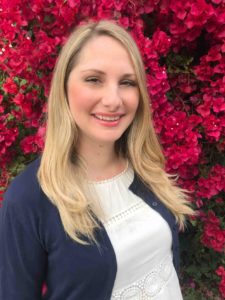 Natalie Lakosil is an agent at the Irene Goodman Literary Agency. An honors graduate of the University of San Diego, California, Natalie holds a B.A. in Literature/Writing. For over a dozen years, she has championed and helped build the careers of numerous award-winning, critically acclaimed, and bestselling authors. Natalie represents adult nonfiction, adult cozy mystery/crime, female-driven thrillers, upmarket women’s/general fiction, illustrators, and all ages (picture book, chapter book, MG, YA) of children’s literature, both fiction and nonfiction.
Natalie Lakosil is an agent at the Irene Goodman Literary Agency. An honors graduate of the University of San Diego, California, Natalie holds a B.A. in Literature/Writing. For over a dozen years, she has championed and helped build the careers of numerous award-winning, critically acclaimed, and bestselling authors. Natalie represents adult nonfiction, adult cozy mystery/crime, female-driven thrillers, upmarket women’s/general fiction, illustrators, and all ages (picture book, chapter book, MG, YA) of children’s literature, both fiction and nonfiction.
In terms of her agenting needs, Natalie is especially looking for:
- BIPOC and underrepresented voices where identity isn’t the focus
- projects with intersectionality
She’s also a “total cat person, unicorn lover, fierce female, and mother of two tiny humans.” She also admits that for a good decade, she was terrified of going back in time and screwing up her life. “I literally documented my schedule and everything I needed to do so that if my adult self ever went back in time and went into my own kid body, I’d be able to pick right up and not screw up my grades.”
Now that we’ve got a good sense of who Natalie is, let’s get to that interview and find out more about what she does!
RVC: When you were a kid, what was your relationship to reading and writing?
NL: Oh, great question. While I always wanted to be a writer, I didn’t love writing until middle school. That might because I got Cs in spelling and grammar throughout elementary school–I was really bad at capitalizing words and spelling. Because I started reading so much in middle school, I did a 180 and writing became my strongest subject.
Love came first. Perfecting and honing the skills came second.
RVC: I love the idea of turning a weakness into a strength. What books proved important in fostering that love for reading and writing?
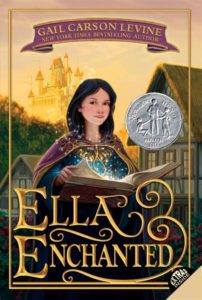 NL: My go-to is Ella Enchanted, though when I really started reading a ton, I was into Meg Cabot and Tamora Pierce. That’s when I fell in love with the age level I handle now as an agent. Then I moved on to romance novels.
NL: My go-to is Ella Enchanted, though when I really started reading a ton, I was into Meg Cabot and Tamora Pierce. That’s when I fell in love with the age level I handle now as an agent. Then I moved on to romance novels.
Teresa Medeiros, Jude Deveraux, Nora Roberts, Julia Quinn–all those greats inspired me to want to do it myself, but also to help others. I wanted to represent them and help their careers, too. I still have the books that I loved the most (except for library books–checked out one a day!) so here’s a 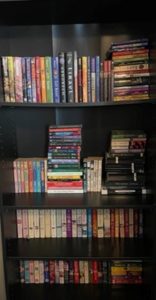 glimpse at that shelf.
glimpse at that shelf.
RVC: What was the career goal you had when you went to UCSD to study literature and writing?
NL: I’m one of those really weird agents because I started writing at such a young age. My mom got me Jeff Herman’s annual Guide to Book Publishers, Editors & Literary Agents when I was thirteen and that’s how I found out what a literary agent was. I was like, “That! I want to do that!” So, I went into UCSD with this five-year plan. I was going to graduate, move to New York, then w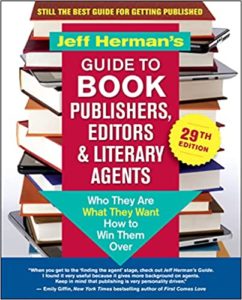 ork at an editing house–maybe even work as a copy editor for a bit, to get my feet wet and build my connections–and then I was going to become an agent and write a lot, as well.
ork at an editing house–maybe even work as a copy editor for a bit, to get my feet wet and build my connections–and then I was going to become an agent and write a lot, as well.
Obviously, my five-year plan didn’t happen. I got an internship in college at an agency. Once I actually start working in the industry, I didn’t want to be a writer anymore. I just found I couldn’t get past my own head. I’d be critiquing my own ideas and I’d say, “Oh, my goodness, I don’t know that I’d be able to do everything that writers do.” I shifted completely away from writing myself.
RVC: Is that internship what led you to your first “real” job in a literary agency? That was with Sandra Dijkstra, right?
NL: Yes. I interned there for a couple years, and then I interned at a newspaper, where I quickly found out that journalism writing wasn’t for me!
When I graduated, I thought I was going to go to grad school and get my PhD in English. I got rejected everywhere. Then I reached out to the agency where I interned and asked, “Got any openings?” They did. I got really, really lucky.
RVC: At the agency, were you working on kidlit from the start?
NL: Oh, I never thought I was going to go into handling children’s books at all. I thought I was only going to do romance novels. That’s what I was reading. That’s all I wanted to do. I liked women’s fiction, historical fiction, romance novels. When I eventually made my way up to being an agent, I was told that I was now the children’s agent at the agency. I said “Okay!” and I figured it out.
Through trial and error, I actually found I was pretty good in this space. Before long, I fell totally in love with children’s books. I just kept pushing my way into all the different genres, and I now represent everything within the children’s area. Today, it’s almost all of my list. I’m trying right now to break into more adult nonfiction, but I don’t take on romance novels at all anymore (only from existing clients).
RVC: This change to kidlit as a focus–was that still at the first agency, were you at Bradford by then?
NL: It was the first agency. The Sandra Dijkstra Literary Agency.
RVC: What was the first picture book you got to work on?
NL: It was by a client who’s still with me–Roseanne Greenfield. And to this day, I’m still trying to sell that first picture book. I’ve gone on to sell seven other books for her, but the first one we worked on together didn’t sell. It was a lyrical nonfiction texts about bioluminescence, and I still think it’s going to sell. I love it so much!
RVC: It sounds pretty cool to me, too.
NL: Roseanne helped ease me into things because she’d been previously represented by the Andrea Brown Agency–she was a talent. And she’d already published several books before we worked together. So, I actually grew a lot with her.
RVC: What are some of the lessons you learned by agenting children’s books?
NL: What I learned over the years was that you’re going to suck at it for a little bit. You have to push past that, the “I don’t know what I’m doing, and nothing is selling–why is nothing selling…WHY?” because you’re kind of figuring out your own path.
Obviously, I didn’t NOT sell anything, but I have a much stronger sell-through rate now. Back then, I was still building connections. I learned that you have to stay flexible as an agent. Don’t be afraid to branch into something new, even though it’s going to take work. You’re going to have to do a lot of research. You’re going to have to talk to colleagues. You’re going to have a lot of trial and error and not be perfect in your style and process. That could all take years, but it’s worth it in the end. You just have to push past that learning curve.
RVC: Is it REALLY that different working at different agencies?
NL: In terms of perspectives and ideas, yes, there’s absolutely a difference at each place. And agencies absolutely are and should be thinking about different voices in the room and opening space for new agents and underrepresented voices. But it’s also an apprenticeship model, so usually the hope is that an intern or an assistant will stay and build into an agent.
As for moving around, career-wise, I’ve grown, so I’ve had different needs. I needed a lot of support and handholding when I was new, versus now, I just need more administrative support. Moving agencies is kind of just you growing in your career. As an agent, you have to reevaluate where you’re at. Is it offering what you know you need? If you have a conversation with the team and it’s just not the right fit, you sometimes have to move.
RVC: I’ve had those same conversations with college and universities, too. I’m at my seventh one now, though I’ve been here for 13 years.
NL: I don’t know if this is still the case today, but that’s how it was back then. The idea was that you can’t be friends with other agents–they’re your competition. My next agency was the complete opposite of that. They were more, “Let’s talk about stuff, and be friends with people.” I even ended up joining a book club with other agents, including ones from other agencies. We all came to each other with what we’re facing, what was going on, and we just bounced things off of each other. I grew so quickly that way because we were all at varying levels. Collaboration is so important to growing. Everybody does things a little bit different as an agent. Every agent is going to have their own style. Even today, I do a lot of mentoring.
I’m still learning things about how different agencies operate. And I know it’s okay not to have all the answers. As long as you’ve got a support system, you’ll be fine. There’s room for all of us. We’re going to sell books, even if we have tastes that overlap. We’re making sure we’re all working in a good way which helps the industry too because editors get overwhelmed. That’s partially because some newer agents don’t have anybody to talk to. “Should I do this? Or should I do this?” they wonder. That creates problems in the pipeline for everybody.
RVC: Why is the Irene Goodman Literary Agency your forever home?
NL: The structure. The way this agency is set up, there’s no reason for me to ever leave. It’s very much like owning my own agency and running a business, yet I have the resources of an incredibly successful team with me. And compensation-wise, it’s all about long-term growth, which fits where I’m at. I feel like I have the best of both worlds here.
RVC: What is the hardest part about being a literary agent?
NL: The emotional roller coaster of the industry. I get rejection daily. I pour my heart and soul into projects that don’t sell. I fall in love with projects that I don’t get to work on. I get horrible news when a book is cancelled, or something bad happens and something’s in jeopardy for an author or client. There are so many things that shift daily that you have to practice self care a lot so you can manage the ups and downs.
It’s commission work, too. Not everybody works on commission, but at least for me, it means there are ups and down throughout the year. You could have a fantastic first quarter that makes your year, then maybe nothing comes in for the next couple months and you’re questioning, “Am I ever going to sell a book again?” because you’re seeing other agents doing amazing things. And you’re thinking like, “Oh, should I be doing that?” There’s a lot of comparison going on. It’s like the Facebook thing, a lot of people shouting about all their amazing things. But they don’t share the hardships, and we all experience hardships.
RVC: It’s so refreshing how honest you are on all of this. In fact, I’m going to take advantage of that and ask you a question I don’t ask people in these interviews. Brace yourself!
Whenever I talk to other writers, most of them complain about their agents at some level. What would be the thing your clients might complain about you? It’s a terrible thing to ask, I fully realize, but I’m so interested in your thoughts here.
NL: Honestly, I hope there’s nothing. I try my best. I have end-of-the-year calls where I review with everybody to make sure we’re aligned vision-wise and career-wise, and we have clear goals for the next year. I always ask, “Is there anything else that I could be doing better for you or more for you?” I’m not afraid of hearing from my clients or having to adjust to a client’s needs.
I was a little behind in reading because I got COVID, so I didn’t work for two weeks, which set me back like two months.
RV: Sorry to hear that!
NL: It was frustrating. But I dug out!
Specific to picture book writers, because they are so prolific, it can be really frustrating for them when we have to talk about how many things we can submit at a time or how often. I’m very strategic about what we try to sell. I’m not just throwing everything out there. We’re carefully building careers.
With a debut author, I find that they want to do everything even after they sell that first book. They ask, “What else can I do? What more can I do?” It’s because the mindset hasn’t shifted yet from “I need to sell, I need to get on submission, I need to sell!” But again, we have to be strategic, and we also don’t want to damage relationships. I usually see that shift as launch approaches, and they realize, “There’s going to be so much work with editorial and launch and marketing.”
RVC: Oh yeah. That part of the process can and does take up a lot of time.
NL: I interact a lot with my clients, and they interact with each other. I have a ton of client resources on a client portal at my website where I literally just downloaded all of my years of information and workshop materials for them. I’m always available for calls and I check in a lot. Communication is pretty important to me. I need that and I need honesty from them so I can be a fierce advocate.
RVC: Let’s talk about how all that support and those client resources have translated into successes. What’s a favorite client success story?
NL: It’s a hard question. Do I have to pick just one?
RVC: We don’t have to call it your #1 favorite–just one of your many favorites. We don’t anyone to feel snubbed, right?
NL: There are different kinds of successes. When I worked with Tiffany Jackson for six years, seeing her rise from debut to bestselling author and watching her talent be recognized was just so wonderful. Though there’s immediate successes, too, where you sell an author’s debut for six figures plus, and then they continue to rise from there.
RVC: Both of those sure sound like the definition of success to me!
NL: I think there’s a a fallacy in the industry to say that success is based on one thing, because I have authors that aren’t bestsellers, but they’re consistently selling well, and they’re consistently publishing new books. To me, that’s successful. That’s a very successful career.
RVC: I agree completely. Now, some writers get writer’s block. Do you ever get agents block?
NL: Yes. With the ups and downs of working for yourself, you have to push yourself to do stuff. And there are times when I’m in a rut, you know, where I’m just not finding anything that sounds great to me. I’d like to sign someone, but nothing is really hitting it.
There are those lulls in the industry too such as right after Thanksgiving where the whole industry is wondering, “Are we on vacation yet?” That’s a challenging time because you just kind of want to be with friends and family. The rest of the industry also does, but there’s still a ton of work to do for everybody.
RVC: What do you think of the state of kidlit right now?
NL: It’s in a really exciting place. With picture books, we’re having a renaissance. Lots of picture books are selling for more than they ever did before. I’m loving the conversations that we’re all having together about how we work, what kinds of things we work on, who we’re working with in the process of the above, and really questioning everything. We need to make sure we’re not just doing things because it’s how it’s always been done. And, finally, we’re opening the door and recognizing the need for voices as diverse as the rest of the country. It can be challenging to navigate sometimes, but I’m not afraid of that challenge.
RVC: Brag time, what’s a project or two that you’re really excited about?
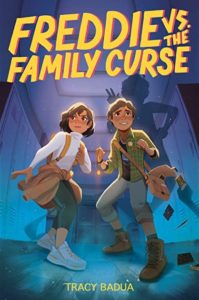 NL: I have a middle grade novel that releases in May called Freddie vs. the Family Curse. It’s so cute and fun. Everyone who reads it is just falls in love with the humor and the characters; it has two starred reviews already. I’m really, really excited to see that one hit the market.
NL: I have a middle grade novel that releases in May called Freddie vs. the Family Curse. It’s so cute and fun. Everyone who reads it is just falls in love with the humor and the characters; it has two starred reviews already. I’m really, really excited to see that one hit the market.
I also have a debut YA coming up, called The Loophole that’s coming out in June. It’s got one of those memorable voices and while it’s fun and funny, it also just tugs at your heart and gives you all the feels. I can’t wait for people for the world to read it.
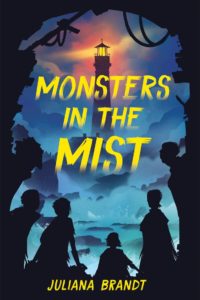 I also have a new novel from the talented Katie Henry coming soon, Gideon Green in Black and White. It’s already got some starred reviews; her writing is sharp and funny and delightful and this new one has a mystery noir edge I think readers will love. And I have to mention Juliana Brandt’s next MG page-turner Monsters in the Mist. She tackles really tough subjects through genre metaphor, and her writing is incredible. This one explores grief and processing trauma through a haunted island (which is also just a spooky and creepy ghost story!).
I also have a new novel from the talented Katie Henry coming soon, Gideon Green in Black and White. It’s already got some starred reviews; her writing is sharp and funny and delightful and this new one has a mystery noir edge I think readers will love. And I have to mention Juliana Brandt’s next MG page-turner Monsters in the Mist. She tackles really tough subjects through genre metaphor, and her writing is incredible. This one explores grief and processing trauma through a haunted island (which is also just a spooky and creepy ghost story!).
RVC: Any picture book bragging?
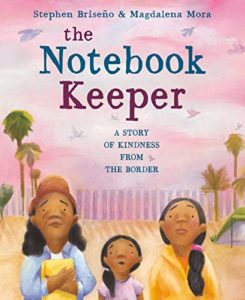 NL: Oh, gosh, I have a lot of picture books in the works. In June, The Notebook Keeper: A Story of Kindness from the Border comes out. I read it and I wanted to cry–we sold it immediately. It’s so moving and beautiful. It’s going to affect a lot of people.
NL: Oh, gosh, I have a lot of picture books in the works. In June, The Notebook Keeper: A Story of Kindness from the Border comes out. I read it and I wanted to cry–we sold it immediately. It’s so moving and beautiful. It’s going to affect a lot of people.
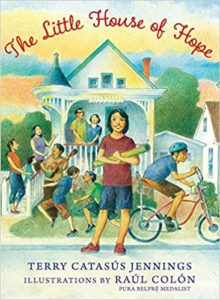 I have another picture book coming out in May that also made me want to cry. It’s called The Little House of Hope. It’s got an English and Spanish version and it’s about this house that becomes a refuge for all sorts of people coming into the country and how over the years, people come in and out as they find their footing. It’s always a place where people can safely go.
I have another picture book coming out in May that also made me want to cry. It’s called The Little House of Hope. It’s got an English and Spanish version and it’s about this house that becomes a refuge for all sorts of people coming into the country and how over the years, people come in and out as they find their footing. It’s always a place where people can safely go.
RVC: Okay, Natalie, we’re moving into the the lightning round. Fast Qs and faster As. Are you prepared?
NL: I guess?
RV: We’ll soon find out. HERE WE GO! If animals could talk, what animal would be the most annoying?
NL: Birds.
RVC: If the answer is “unicorn,” what’s the question?
NL: “What’s your soul animal?”
RVC: How do you organize your books?
NL: My client books, alphabetically. The books I read, by the order I read them in.
RVC: If I looked at your workspace, what are some of the things I’d see?
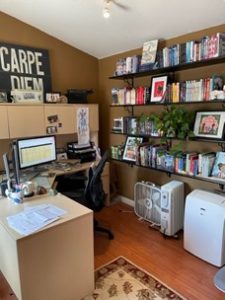 NL: A ton of books everywhere. I have a huge floor to ceiling shelving of all my client titles. And hopefully you notice all the plants in the room. I’m very big on plants. I have an enormous sign that says Carpe Diem and crystals everywhere. Hopefully it all looks organized and clean, too.
NL: A ton of books everywhere. I have a huge floor to ceiling shelving of all my client titles. And hopefully you notice all the plants in the room. I’m very big on plants. I have an enormous sign that says Carpe Diem and crystals everywhere. Hopefully it all looks organized and clean, too.
RVC: What’s a recent picture book that came out that really caught your attention?
NL: I have a four-year-old and a seven-year-old so I’m constantly buying picture books. A few recents: Perfectly Pegasus by Jessie Sima, Itty-Bitty Kitty Corn 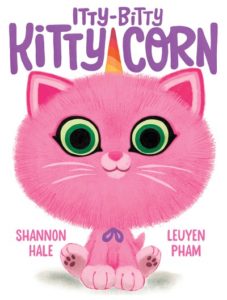 by Shannon Hale, Take a Breath by Sujean Rim, The Year We Learned to Fly by Jacqueline Woodson.
by Shannon Hale, Take a Breath by Sujean Rim, The Year We Learned to Fly by Jacqueline Woodson.
RVC: What’s your agenting philosophy in six words or fewer?
NL: Transparency, honesty, strategy, passion, client satisfaction, and collaboration.
RVC: Thanks so much, Natalie. This was terrific!


Natalie is a fantastic agent! I am honored to be represented by her.
Lucky you! Natalie seems truly terrific. Thanks for stopping by OPB. 🙂
Wow, this is such an amazing interview–not only the quality questions but the very honest answers. I love your attitude re work, Natalie, that “get past the curve & move onwards & upwards,” if you will. And your love of lit is clearly evident! Thanks so much for sharing with us!
Thanks for the kind words. I could tell Natalie was game to get real, so I asked some harder questions than usual.